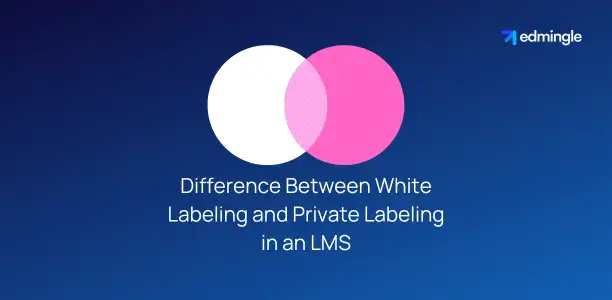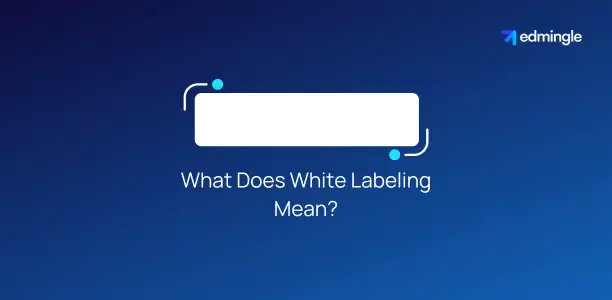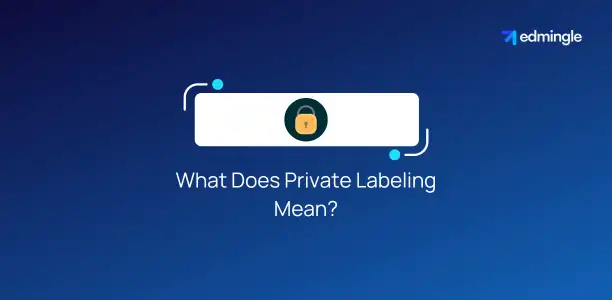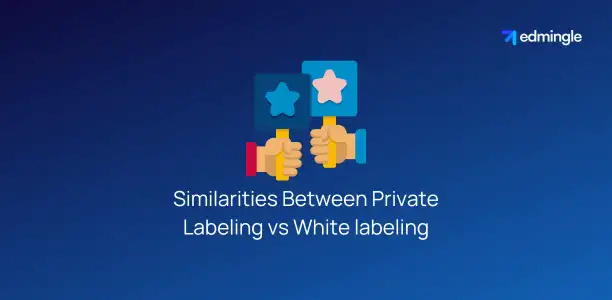
Navigating the world of learning management systems can be a complex journey. Especially when it comes to the miniscule difference between white labeling and private labeling.
Both these terms are often used interchangeably but hold distinct meanings. Particularly in the LMS industry.
And understanding this difference between white labeling and private labeling. Ensures a clear & focused approach for educators and trainers alike.
This blog post aims to clarify the difference between white label and private label LMS.
What is the Basic Difference Between White Label and Private Label?

The basic difference between white label and private label products. Lies in customization and branding specifics.
White label LMS platforms are generic offerings. That are manufactured by one company but sold and branded by various retailers.
Whereas, private label LMSs are exclusively manufactured for a specific retailer. Who then sells them under their own brand name.
In short. The fundamental distinction lies in that white label products are generic products. While private label products are tailored.
What Does White Labeling Mean?

The white label model refers to the practice where a product is produced by one company. But is rebranded and sold by another company under their own brand name.
This approach allows the reseller to offer a product. Without the need to invest. In developing the technology or infrastructure to create it.
Advantages of White Labeling
| Brand Building: Businesses can expand to a wide range of products/offerings quickly. Under their own brand, thus enhancing brand visibility and loyalty. |
| Cost-Effective Solution: White label products eliminate the high costs & time associated with LMS development. |
| Focus on Core Strengths: Educational institutions or training providers can focus on their strengths like unique curriculum. Thereby, leaving product development to others. |
Did You Know?
Using Edmingle for your training business can help reduce your operational cost by 20%.
Challenges of White Labeling
- Limited Control: With a white label model, the reselling company has limited control. Over the core LMS features.
- Dependence on Suppliers: Any issues with the supplier directly impact the reseller. This includes bugs or technical issues. But with Edmingle’s exceptional customer support & service, solving issues becomes a breeze.
- Competition: Since the same type of product is available to multiple resellers, it can increase market competition. And the one thing that will set you apart is your own content, creativity & USP.
White Label Examples
| Financial Services: Bank like agencies often use white label products for investment. And the distribution is under their own brand. | Retail: Supermarkets sell electronic/physical products manufactured by a third-party manufacturer. But branded as their own. |
Redefine your training brand’s potential with Edmingle’s White-Labelling.
What Does Private Labeling Mean?

Private labeling is when a retailer contracts with a private label manufacturer. To create a unique product for them to sell exclusively.
Unlike white labeling, private label products are typically customized to the retailer’s specifications. And sold only under their brand name.
Advantages of Private Labeling
- Exclusive Control: Retailers have more control over the LMS’s quality, design & price.
- Higher Profit Margins: Due to exclusivity and brand loyalty. Private label products can yield higher profit margins.
- Customization: Products can be tailored to meet the specific needs of the retailer’s customer base.
Since we talked about pricing in this section. Read our complete guide to learning management system pricing for a well informed decision-making.
Challenges of Private Labeling
| Higher Investment: More investment is needed in product development and design. |
| Inventory Risk: Retailers might face higher risks in terms of unsold inventory. |
| Brand Development: Requires effort in building and maintaining a brand that resonates with consumers. |
Private Label Examples
- Apparel: Many fashion retailers have their own private label brands that offer exclusive designs.
- Grocery Chains: Offering store-brand physical products, such as organic food items. That cannot be found in other stores.
Both white labeling and private labeling offer avenues for brand growth & product expansion. But they also come with distinct strategies, benefits, and challenges.
10 Key Difference Between Private Labeling and White Labeling
The table below lists down the key difference between private labeling and white labeling.
| Factors | Private Labeling | White Labeling |
|---|---|---|
| Definition | Products exclusively manufactured for and sold by one retailer. | Products manufactured by one company and branded by another. |
| Brand Control | High, as products are customized and exclusive to one brand. | Limited, as the product is generic and sold by multiple brands. |
| Customization | High. Commodities are tailored to retailer’s specifications. | Minimal. The commodity is generally standard across retailers. |
| Product Exclusivity | High. Products are unique to the retailer’s brand. | Low. Identical products are available from multiple retailers. |
| Development/Production Cost | Higher. Involves both development and customization. | Lower. No need for development. |
| Profit Margin | Potentially higher due to brand exclusivity. | Typically lower due to competition. |
| Market Entry | Requires more investment & time on product development. | Easier and faster. Ideal for businesses looking to expand quickly. |
| Target Market | Specific. Targeting the retailer’s specific customer base. | Broad. Aiming to appeal to a wide array of customer base. |
| Risk | Higher. Directly tied to the retailer’s brand and marketing. | Lower. Relies on the manufacturer’s success. |
| Inventory Responsibility | Managed by the retailer, which includes higher inventory risks. | Typically handled by the manufacturer. |
To learn more about the advantages of white-labeling. Check our blog on white label LMS platforms.
Similarities Between Private Labeling vs White labeling

Despite their differences, both white label and private label products share several similarities.
- Both marketing strategies allow businesses to expand their offerings. Without investing in the build from scratch process.
- In each case, the retailer is able to sell these under their own brand name. This helps in building brand identity and customer loyalty.
- Both white label and private label strategy also provide a degree of speed to market. Hence, allowing businesses to introduce new items more quickly. Than they could if they were to develop them in-house.
- Additionally, both approaches offer cost advantages. As they eliminate the high expenses associated with research, development, and manufacturing.
This makes them attractive options. Especially for businesses looking to grow their product lines or offerings. That too, efficiently and effectively.
Which one is Right for You: White Labeling vs Private Labeling?
Choosing between white label providers or private labeling. Well, it entirely depends on your business goals, resources & market strategy.
Here’s a step-by-step breakdown to help determine which might be right for you:
| 1.Consider Your Branding & Control Preferences | If brand identity and control over product development are paramount. Private labeling may be more suitable. It allows for greater degree of customization and exclusivity. If you’re more focused on expanding your product line. With less concern about uniqueness or control over pricing. White label solutions could be the better choice. |
| 2.Evaluate Your Investment and Risk Appetite | Private labeling typically requires a higher investment in product development. And a higher risk due to inventory management. It’s ideal for businesses willing to invest more. For greater returns and brand uniqueness. White label services involves less upfront investment and lower risk. It’s suitable for businesses looking for a cost-effective and quick market entry. |
| 3.Assess Your Market and Customer Base | If you have a specific target market or client base. One that values uniquely tailored solutions for their needs. The private label model might be more effective. For a broader market demand of standardized commodities. White label solutions can be advantageous. |
| 4.Resource and Expertise Considerations | Private labeling might require more in-depth market knowledge. And a stronger grasp of development. White label manufacturers allow you to leverage their expertise. Thus, focusing your efforts on marketing and sales. |
| 5.Long-Term Business Strategy | If your long-term strategy involves building a distinct brand. With a loyal customer base. Private label brands can support this goal. For diversifying your product offerings quickly without a significant brand differentiation strategy. White label marketing is more apt. |
Ultimately, the decision should align with your business’s strategic objectives. And furthermore with your market positioning, and capacity to manage the production process involved.
Each model offers distinct benefits and challenges. So consider what aligns best with your business model and growth plans.
Summary on White Label and Private Label
Both strategies hold significant potential. Especially for training businesses looking to expand & strengthen their brand/market presence.
White labeling serves as a practical solution. Majorly for businesses aiming to broaden their offerings. Without the complexities of product development.
On the flip side. Private label companies allow for a deeper dive into brand identity and customer service/engagement. Through customized products, but with a higher initial investment and risk.
However, the major difference between white labeling and private labeling isn’t just this. But it lies in their alignment with business goals. The final choice hinges on your business’s unique needs. Along with it’s market strategy and long-term vision.
FAQs on Difference Between White Label and Private Label
1.What is the main difference between white labeling and private labeling?
The subtle difference lies in branding and product customization. White labeling allows multiple retailers to sell a generic commodity. Under their own brand name with minimal customization. In contrast, private labeling involves creating an exclusive product for one retailer. Allowing for more customization and brand exclusivity.
2.Can the same commodity be both white labeled and private labeled?
Generally, no. A white labeled product design is generic and sold by multiple retailers. While a private labeled product is tailored to the specifications of a single retailer. And sold exclusively under their brand.
3.Can both white label and private label services be profitable for a business?
Yes, both can be profitable. White labeling allows quick market entry with lower costs. While private labeling can lead to higher profit margins. Due to product exclusivity and brand loyalty.
4.Which is better for a business just starting out, white label or private label business models?
This depends on the business’s resources and strategy. White label might be better for startups looking for a low-cost, low-risk entry into the market. Private label could suit those with more resources. And a desire for brand uniqueness from the start.
5.In which industries is white label or private label more prevalent?
Yes, white label is common in industries like software, electronics, and cosmetics. Whereas private label is prevalent in food and beverage, clothing & personal care industry.
6.How does consumer perception differ between white labeled and private labeled products?
Consumer perception can vary. White labeled ones may be viewed as less exclusive but more affordable. While private labeled ones often enjoy a perception of being high-quality products. Due to their tailored nature and brand specificity.






Leave a Reply